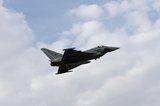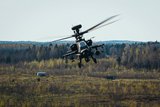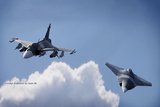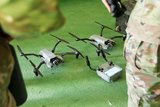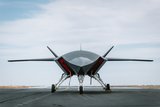Northrop Grumman and Raytheon complete missile interceptor review
The Northrop Grumman and Raytheon team complete a major milestone to advance the US Next Generation Interceptor program. (Image: Northrop Grumman)
The Northrop Grumman and Raytheon Technologies Next Generation Interceptor (NGI) team has completed its Systems Requirements Review (SRR) for the US Homeland Defense Interceptor program.
The aim of the program is to protect the US against intercontinental ballistic missile threats in the 2030s.
With the review finished, the team moves on to start initial system design, further risk reduction testing and critical component qualification activities.
The Missile Defense Agency approved the SRR after the team demonstrated its NGI Common Software Factory, which enables rapid deployment, integration and delivery in a DevSecOps environment.
Northrop Grumman and Raytheon Technologies are leveraging high-fidelity model-based system engineering and hardware manufacturing in customer-certified facilities.
The team is also conducting internally funded risk reduction hardware development and testing to support the rapid deployment of NGI.
Scott Lehr, VP and general manager, launch and missile defense system, Northrop Grumman, stated: ‘We’re leveraging our two decades on performance on the current Ground-Based Interceptor’.
VP of Strategic Missile Defense, Raytheon Missile & Defense, Tay Fitzgerald outlined the experience Raytheon brings to the team ‘with 47 successful exo-atmospheric intercepts achieved to date’.
The companies initially received the contract to develop the NGI last year, in May 2020.
More from Air Warfare
-
![Singapore Airshow 2026: Airbus-RSAF H225M teaming tests point to future scalability]()
Singapore Airshow 2026: Airbus-RSAF H225M teaming tests point to future scalability
The tests between a Republic of Singapore Air Force H225M and Airbus Flexrotor uncrewed aerial system were designed to allow the crew to receive and process real-time data from the UAS while maintaining direct command and control.
-
![Singapore Airshow 2026: Saab eyes “share” in future fighter market, targets 2027 CCA demo flight]()
Singapore Airshow 2026: Saab eyes “share” in future fighter market, targets 2027 CCA demo flight
The Swedish government is expected to make a decision on the next steps of the Future Fighter System Concept programme by 2030, with the current second phase focusing on technology knowledge expansion and demonstration flights.
-
![Singapore Airshow: Red Cat ramps up portfolio development amid “key” APAC opportunities]()
Singapore Airshow: Red Cat ramps up portfolio development amid “key” APAC opportunities
In the wake of its 1,842% year-on-year revenue increase in Q4 2025, Red Cat sees mass opportunities in the Asia-Pacific region as the company eyes an ongoing production increase and market growth.
-
![India confronts widening military helicopter gap as border demands intensify]()
India confronts widening military helicopter gap as border demands intensify
India’s major helicopter programmes are under the spotlight as the country turns to global partners to replace legacy helicopters with growing urgency.
-
![Singapore Airshow 2026: Boeing’s MQ-28A targets key 2028 date as Block II ground tests begin]()
Singapore Airshow 2026: Boeing’s MQ-28A targets key 2028 date as Block II ground tests begin
The MQ-28A Ghost Bat is the most mature CCA platform currently under development, with Boeing looking to accelerate its timelines and development of the aircraft.
-
![Latin American air forces look beyond fighters to revamp transport aircraft fleets]()
Latin American air forces look beyond fighters to revamp transport aircraft fleets
The Mexican Air Force has become the first Latin American operator of the C-130J Super Hercules, but the service is not alone in acquiring a tactical airlifter in recent months.









